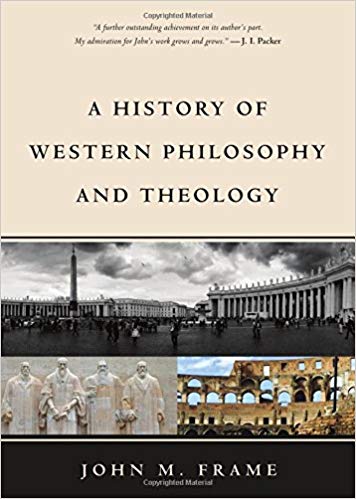Recommended Reading
From Amazon.com: "Christians should evaluate philosophy by biblical criteria. This will shed greater light on the developments in the history of philosophy and better prepare us for the intellectual challenges of our time. The fall of Adam brought intellectual as well as moral corruption on the human race, and the effects of the fall can be seen in the work of philosophers, most of whom try to understand the world autonomously through reasoning apart from God's revelation. Some philosophers have appealed to God's revelation, but their work has often been compromised with the wisdom of the world. Revelation should inform reason, and not the other way round. In the past, even Christian theology was corrupted by the movement toward intellectual autonomy, creating the tradition of liberalism, which has unhappily dominated academic theology down to the present day. But there is hope a new generation of Christian thinkers take God's Word seriously. Frame's unique new contribution augments that process."
If you purchase from one of our Amazon.com links, we receive a small commission that helps support this site and does not cost you any extra.
Degree in Divinity - A Worthwhile Venture?
If you are interested in pursuing a degree in divinity, you have probably asked yourself at one time or another if the investment in time and resources is worth it. After all, a standard divinity degree - the MDiv - takes at least three years to complete, sometimes more. Still, most students who earn the degree believe the time spent is well worth it.
Versatility

For starters, a degree in divinity is actually quite versatile. One studies the Bible, history, theology, philosophy, psychology, education, and a slew of other subjects. This wide range of courses provides a solid foundation for graduate-level study in many fields, not just theology.
Job Options
The versatility of divinity degrees regarding possible career choices is another reason for their popularity. Of course, divinity students often pursue church-oriented vocations, such as pastoral ministry and Christian education. However, divinity degrees also provide preparation for chaplaincy, counseling, advocacy, administration, and numerous other career choices.
A Critical Mindset
Regardless of the type of seminary or divinity school one attends - conservative, liberal, non-denominational, mainline - one of the most important skills any divinity student must nurture is that of critical thinking and critical writing on a variety of subjects. At least in theory, divinity students should learn how to balance the strengths and weaknesses of an argument, a skill that is valuable in a variety of areas, not just pastoral ministry or theology.
An Aid to Ministry
To be sure, most students who attend seminary or divinity school do so in order to prepare for professional ministry in the church. While earning a divinity degree is certainly not required to serve the church (I'm pretty sure none of the apostles had an MDiv), not only can it help you hone your skills for seminary, many denominations and even independent churches require ministers to have seminary training.
Having a well-educated clergy certainly has a plentitude of benefits. The Christian faith has a rich history and tradition, one that has a complex relationship to surrounding cultures. Being able to understand and articulate how Christianity developed and grew can be very helpful in teaching one's congregation as well as others about the basic tenets of the faith.
And to perhaps state the obvious, learning how to read, interpret, teach the Bible in all of its simple yet complex truths is a benefit to any minister. Learning the history of Biblical interpretation as well as skills such as language study and hermeneutics is vital for learning and teaching the wide range of Biblical texts.
Conclusion
In short, a degree in divinity is indeed a worthwhile pursuit, one that should be carefully considered for any potential minister or student of theology.

